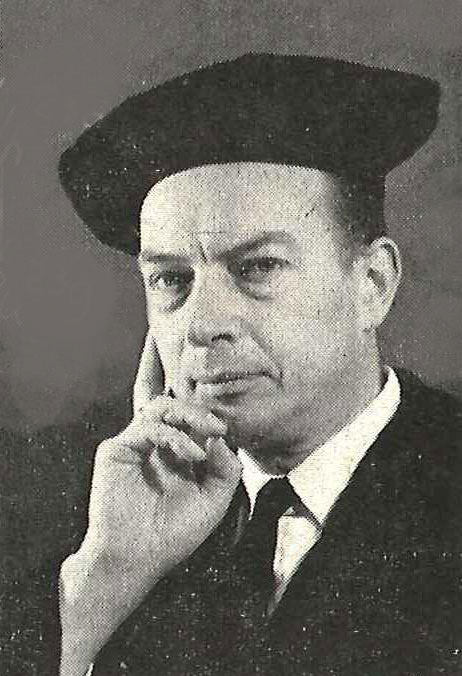It is with sadness informing you that Professor J. (Jan) P.W. Houtman passed away on December 30, 2011. In 1959, Houtman was appointed as Director of the Reactor Institute Delft and Professor at the Delft University of Technology to provide education and perform research on the ‘Chemical aspects of nuclear reactors’.
As such, he created the basis for the Department of Radiochemistry at the Reactor Institute Delft.
Houtman graduated in 1941 in Delft in Chemical Engineering and worked for several years in industry in The Netherlands. Already in 1945 he got familiar with nuclear research reactors through a scientific visit to Harwell, UK. From 1948-1955 he was appointed as Professor at the University of Technology in Bandung, Indonesia.
Already at the time of his appointment in Delft he realized that a solid network of stakeholders in the academic, governmental and industrial fields would be indispensable for justifying the existence and use of the nuclear research reactor. As such, he formally demanded permission to spend one day per week for building such a network.
Professor Houtman combined a broad interest in opportunities of research reactors as a source of neutrons with excellent didactic qualities. He initiated the first practical course in radiochemistry for undergraduates, obligatory for students in chemical engineering.
He inspired and stimulated his students and associates in the Department to form alliances and to collaborate with
scientists in the applied fields. The initial radiochemical research program included neutron activation analysis, ‘hot’ atom chemistry and (biomedical) applications of radiotracers; areas of which he conceived the importance already in the early 1960s and that now still are highly relevant and with ample scientific challenges. His early interest in hot atom chemistry has led 50 years later to the pioneering role of Delft in the application of chemical effects of nuclear reactions in the production of medical radioisotopes.
Professor Houtman envisioned the importance of positioning the institute as an ‘Interuniversity’ institute, a national academic facility with easy access for a user community of scientists. He promoted appointments of the senior staff as lecturer or professor at other universities in the country, leading to many successful scientific partnerships.
After his retirement from the Delft University of Technology in 1983, he kept track of new developments through the scientific literature, and regularly interacted via letters to editors on manuscripts with, in his view, doubtful contents. His interest for the impact of trace element to human health made him to start collecting air particulate matter around his private house, to be analyzed at the institute. Until very recently, he kept in close contact with some of his previous colleagues from the institute discussing new developments, threats and strategies for improvement.
Our thoughts are with his wife Ina, their children and their families.
Marcel de Bruin, Peter Bode en Bert Wolterbeek, section Radiation and Isotopes for Health (Faculty of Applied Sciences).
Gisteren gaf Gijs mij een klap voor mijn kop. Dit is de kortst mogelijke versie van deze column, laat ik de rest ook maar vertellen. Ik volg een theater/presentatiecursus aan de TU. Stiekem dacht ik, dit heb ik niet nodig, ik ben een fantastisch presentatrice. Maar waar komt hoogmoed ook alweer voor?
Oké, gisteren dus. “Holle Bolle Gijs is geniaal!”, blaas ik hoog van de toren naar mijn docent en cursusgenoten, “hij houdt in zijn eentje de hele Efteling schoon.” In mijn hoofd doe ik het G-E-W-E-L-D-I-G. Mensen luisteren, glimlachen en knikken instemmend mee. Af en toe barst er zelfs een luid “Whahaha” uit. Toen kwam de donderende klap. Gijs – mijn docent, niet Holle Bolle – vertelt mij over een typisch maniertje dat ik gebruik. Ik hang namelijk het charmante, lieve, kokette (tof woord by the way) meisje uit. Hierdoor luistert, glimlacht én knikt het publiek, maar neemt mij absoluut niet serieus. En dat is hartstikke logisch, ik neem mezelf niet eens serieus wanneer ik dit doe.
Presenteren is niet het enige moment wanneer ik inzet op de extra schattige versie van Merel. Neem mijn vroegere baantjes. Ik stap ergens binnen en moeiteloos bevriend ik Jan en alleman. Maar of ze me echt serieus nemen? Tijdens een fundraising in Australië stopten Ozzies graag om met mij te praten, maar inschrijven, dat ging een stapje te ver. “Are you from France? Because you have a beautiful accent.” Eh … nee en nee, en luister nou eens even naar de milieuproblematiek rondom nucleaire energie…
De confrontatie thuis in bed, wanneer ik de opgenomen beelden terugkijk, is schokkend. Jeetje, wat ben ik
bloedirritant. Dat gewiebel, die gebaartjes, dat makkelijk scoren van een lach, gadverdamme. Makkelijk scoren ja, maar makkelijk scoren is voor mietjes die niets te vertellen hebben, ik zal werken voor waardering. Dit moderne Marilyn Monroe-gedrag gaat linea recta de prullenbak in, vanaf nu geldt het credo: wanneer ik presenteer luister je én je neemt me serieus. Anders geeft dit lieve meisje je hoogstpersoonlijk een klap voor je kop.



Comments are closed.